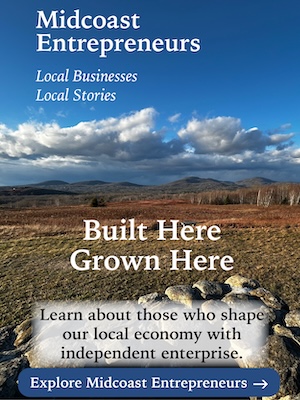Graham Platner draws large Midcoast crowd to Rockport pizza house, outlines goals to serve in U.S. Senate
 As the sun sets Oct. 1, a crowd gathers at Flatbread Pizza, in Rockport, to meet Graham Platner, who is campaigning for U.S. Senate. (Photo by Lynda Clancy)
As the sun sets Oct. 1, a crowd gathers at Flatbread Pizza, in Rockport, to meet Graham Platner, who is campaigning for U.S. Senate. (Photo by Lynda Clancy) U.S. Senate hopeful Graham Platner, of Sullivan, speaks to a large crowd of citizens who want to know more about his platform and his goals in advance of midterm elections 2026. (Photo by Lynda Clancy)
U.S. Senate hopeful Graham Platner, of Sullivan, speaks to a large crowd of citizens who want to know more about his platform and his goals in advance of midterm elections 2026. (Photo by Lynda Clancy) Citizens came from all points in the Midcoast to the Rockport gathering at Flatbread Pizza.
Citizens came from all points in the Midcoast to the Rockport gathering at Flatbread Pizza. Inside Flatbread Pizza, Graham Platner positions himself at the door so that he can speak to the crowd inside the restaurant and the crowd outside the restaurant.
Inside Flatbread Pizza, Graham Platner positions himself at the door so that he can speak to the crowd inside the restaurant and the crowd outside the restaurant.  Cars park on either side of Route 1 in Rockport as the public takes an hour Wednesday evening, Oct. 1, to meet candidate Graham Platner.
Cars park on either side of Route 1 in Rockport as the public takes an hour Wednesday evening, Oct. 1, to meet candidate Graham Platner. Maine Representatives Ann Matlack, D-St. George, and Vicki Doudera, D-Camden) (Photo by Lynda Clancy)
Maine Representatives Ann Matlack, D-St. George, and Vicki Doudera, D-Camden) (Photo by Lynda Clancy) The crowd outside Flatbread Pizza listens to Graham Platner outline his campaign goals. (Photo by Lynda Clancy)
The crowd outside Flatbread Pizza listens to Graham Platner outline his campaign goals. (Photo by Lynda Clancy)

 (Photo courtesy Beth Davis)
(Photo courtesy Beth Davis) (Photo courtesy Beth Davis)
(Photo courtesy Beth Davis) (Photo courtesy Beth Davis)
(Photo courtesy Beth Davis) (Photo courtesy Beth Davis)
(Photo courtesy Beth Davis) As the sun sets Oct. 1, a crowd gathers at Flatbread Pizza, in Rockport, to meet Graham Platner, who is campaigning for U.S. Senate. (Photo by Lynda Clancy)
As the sun sets Oct. 1, a crowd gathers at Flatbread Pizza, in Rockport, to meet Graham Platner, who is campaigning for U.S. Senate. (Photo by Lynda Clancy)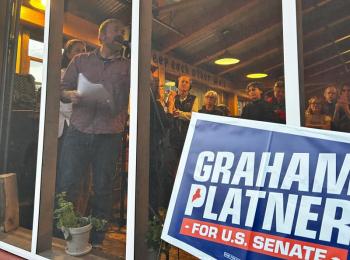 U.S. Senate hopeful Graham Platner, of Sullivan, speaks to a large crowd of citizens who want to know more about his platform and his goals in advance of midterm elections 2026. (Photo by Lynda Clancy)
U.S. Senate hopeful Graham Platner, of Sullivan, speaks to a large crowd of citizens who want to know more about his platform and his goals in advance of midterm elections 2026. (Photo by Lynda Clancy)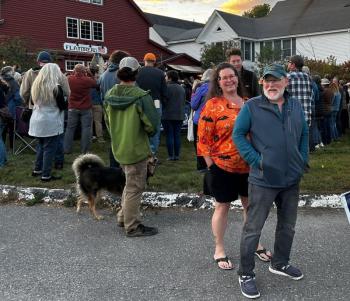 Citizens came from all points in the Midcoast to the Rockport gathering at Flatbread Pizza.
Citizens came from all points in the Midcoast to the Rockport gathering at Flatbread Pizza.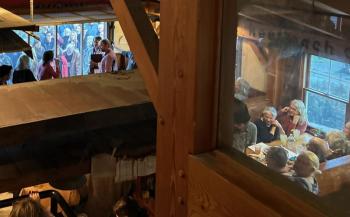 Inside Flatbread Pizza, Graham Platner positions himself at the door so that he can speak to the crowd inside the restaurant and the crowd outside the restaurant.
Inside Flatbread Pizza, Graham Platner positions himself at the door so that he can speak to the crowd inside the restaurant and the crowd outside the restaurant. 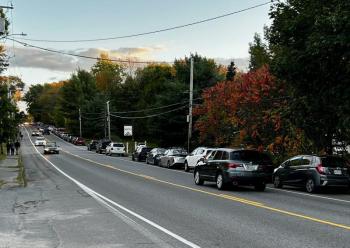 Cars park on either side of Route 1 in Rockport as the public takes an hour Wednesday evening, Oct. 1, to meet candidate Graham Platner.
Cars park on either side of Route 1 in Rockport as the public takes an hour Wednesday evening, Oct. 1, to meet candidate Graham Platner.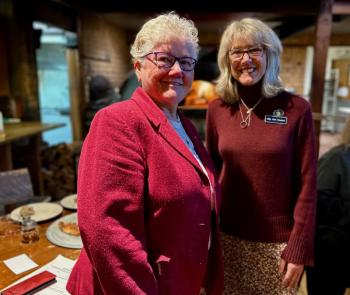 Maine Representatives Ann Matlack, D-St. George, and Vicki Doudera, D-Camden) (Photo by Lynda Clancy)
Maine Representatives Ann Matlack, D-St. George, and Vicki Doudera, D-Camden) (Photo by Lynda Clancy)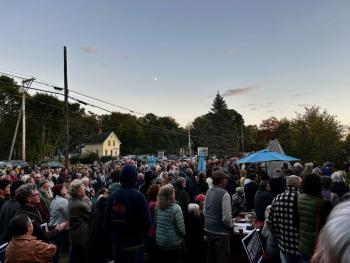 The crowd outside Flatbread Pizza listens to Graham Platner outline his campaign goals. (Photo by Lynda Clancy)
The crowd outside Flatbread Pizza listens to Graham Platner outline his campaign goals. (Photo by Lynda Clancy)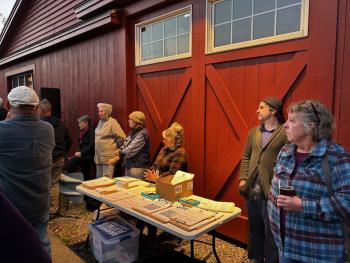

 (Photo courtesy Beth Davis)
(Photo courtesy Beth Davis)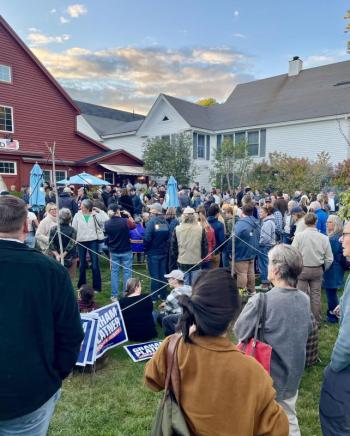 (Photo courtesy Beth Davis)
(Photo courtesy Beth Davis)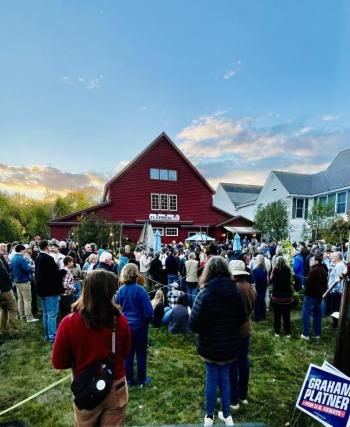 (Photo courtesy Beth Davis)
(Photo courtesy Beth Davis)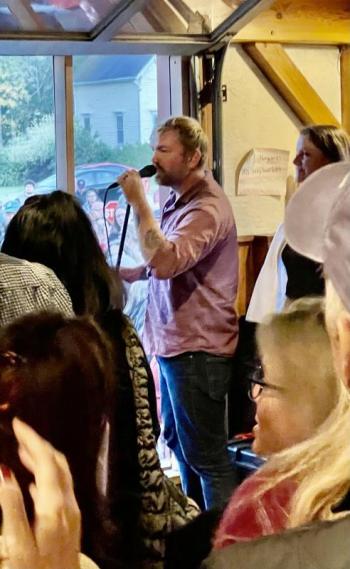 (Photo courtesy Beth Davis)
(Photo courtesy Beth Davis)ROCKPORT — Traffic slowed to a crawl this evening, Oct. 1, along a stretch of Route 1 in Rockport as drivers parked their cars along both sides of the road for half a mile in either direction of Flatbread Pizza, whose parking lot itself overflowed. They were all there to listen to Graham Platner, the unassuming war veteran/Sullivan Harbor Master/Planning Board Chair/oyster farmer and now aspiring candidate for U.S. Senate. He is hoping to claim the seat now occupied by Senator Susan Collins.
Platner seeks first to win the Democratic nomination in next June's primary so that he has the party's endorsement to take on Collins in the November 2026 elections.
He is campaigning now across Maine, and wherever he goes, he draws a crowd. Rockport was no exception: The restaurant inside was filled to capacity, and the overflow, numbering in the hundreds, gathered outside on the grass and in the driveway. It was a spontaneous phenomenon, an indicator that Platner is speaking to the voter.
It was not, as one attendee said, "another chardonnay crowd" campaign gathering of deep pockets. Platner is running a grassroots campaign and is appealing for energy, commitment and help, as much as he is asking for campaign donations.
There were fishermen there at Flatbread Pizza, as well as town managers, teachers, nurses, contractors, state representatives, the the elderly and children.
Platner was only to be there for one hour, and he dove into his prepared remarks just after 6 p.m. Because the crowd grew to such large proportions, the doors to the restaurant were thrown open and Platner stood at the entrance, speaking through a microphone to both those inside and outside.
He spoke about his Down East roots, and the roots of his wife, Amy, who grew up in Hope and attended Camden-Rockport High School. He described his career, and his sudden diversion into national politics.
"My background is in community organizing," he said. "I have never run for electoral office before, which the New York Times loves pointing out. I did do four infantry tours in Iraq and Afghanistan, the Marine Corps and the Army. And I worked a brief time for the State Department.
"Then I moved back home, a few doors down from the house I grew up in, back to Sullivan, Maine, and had the uniquely lucky experience of being able to get into oyster farming. In many ways, it changed my life during my life around in some ways. It really allowed me to feel deeply connected to the place that I'm from. It has engendered in me a love and a respect for the coast of Maine, for all of Maine, and for the people of Maine. That is really driving why I am doing this."
He believes, he said, that it is necessary now to move forward, "into a better world, a way for us to stop being as divided and polarized as we are."
He wants to rebuild politics in this country.
"Growing up in Eastern Maine, piecing it together has always been a part of life for us," he said. "My mom has a great saying. She says that you choose to live in Maine and after that, you figure it out. That tends to be very accurate in my assessment. Working multiple jobs, working seasonal jobs, this is not a new thing for us. So my mom introduced my brother and I to this very early, breaking blueberries in the summer, making wreathes in the wintertime, probably at an age that was highly illegal.
"This idea of the kind of hardscrabble life that we have, working incredibly hard, this is not new to us. It is something that Mainers have been doing for a very long time."
But it has gone beyond hardscrabble to untenable.
"Who here is below the age of 40," he asked the crowd.
Approximately one quarter of those gathered raised their hands.
"Of those folks who just raised their hands, who here thinks of owning a home in in their near future?"
Nobody raised their hands.
"Just like Portland [referencing his recent campaign gathering there], there is literally nothing," said Platner. "Those of us who have been lucky, those of us who have been able to build good lives, even for us, the American dream has become unaffordable. In my own life, Amy and I are trying to start a family, and we're coming face to face with the brutal economic realities of parenting today. It should not be this hard. It does not have to be this hard.
"My brother and his wife live in Portland. They have two children, my niece and nephew. My brother and his wife work full time so they can afford childcare so they can work full time. That is ridiculous.
"It was not that long ago that we had families in this country that could live off of one income. Those days are long gone, though. But it doesn't have to be like this. Everybody in Maine knows that the system that we live in is screwing us. All of us notice. And we know it's screwing us because we look around and we do see a system where an incomprehensible amount of wealth is being built. We watch from the sidelines as a few with wealth and power consolidate more wealth and power than any of us can even comprehend.
"We all look at that and we wonder, why can't we share in that success? Why can our communities not share in that wealth, in those resources?"
As a infantry man, Platner said he is not afraid to name the enemy.
"And the enemy is the oligarchy," he said. "It is the oligarchic structure of our system that is screwing all of us. It's the billionaires who want to hoard wealth and the D.C. elites and establishment politicians who serve them."
Platner cited a system that built by a political class to enrich and support billionaires and corporations on the backs of working people.
"Politicians have made a series of decisions over the past 40 years that have resulted directly in the world we live in today," he said. "In 1990, there were fewer than 100 billionaires in the United States. Today, there are over 800. When you look around, do you see a society that is eight to nine times wealthier than the one you lived in in 1990? Of course not. We don't have nine times the hospitals. We don't have nine times the schools. In fact, we have lost services. We have lost rural healthcare in the state."
Platner warned against supporting the status quo and owing allegiance.
"No one is owed allegiance," he said. "Support needs to be earned. You don't vote for people just because you used to. You should vote for people because they'll fight for you. We should not vote for Democrats as long as they themselves are part of the exact same corporate establishment that Republicans are...
"Susan Collins's charade is wearing thin.... No on cares that you pretend to be remorseful while you sell out to lobbyists, to corporations, and to a president who is right now engineering the greatest redistribution of wealth from the working class to the ruling class in American history. Symbolic opposition does not reopen hospitals. Condemnations and concern does not bring back Roe v Wade."
Platner outlined what he wants to do in D.C., including:
Fight to lower the price of child care and groceries, and medications.
Take on corporate greed and price gouging, "that's been driving the prices of everything we need, up."
Fight for the rights of women to make decisions about their own bodies.
Fight to fund schools and hospitals, "because that is where taxpayer dollars should go, "not dropping bombs on them in Gaza."
Fight to raise the federal minimum wage, "because we have paid for three wars since the last time we did that and I had to fight in two of them."
Support unions.
Reach Editorial Director Lynda Clancy at lyndaclancy@penbaypilot.com; 207-706-6657

















































